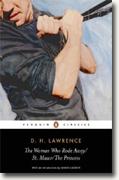The Woman Who Rode Away; St. Mawr; The Princess
D.H. Lawrence
book reviews:
· general fiction
· chick lit/romance
· sci-fi/fantasy
· graphic novels
· nonfiction
· audio books
· author interviews
· children's books @
curledupkids.com
· DVD reviews @
curledupdvd.com
newsletter
win books
buy online
links
home
for authors
& publishers
for reviewers

 |
The Woman Who Rode Away; St. Mawr; The Princess D.H. Lawrence Penguin Paperback 272 pages February 2007 |
|
This slim volume contains three of D. H. Lawrence's classic novellas. The three books - The Woman Who Rode Away, St. Mawr and The Princess - hold many themes and ideas in common, although the stories do narrate different events.
The longest of the three novellas, St. Mawr follows Lou Witt, a white American woman, as each of our three heroines are. Her European/Australian husband, Rico, despite being seen by other women as a catch, has grown dull to her. She cannot see in him, or any man, the traits which she feels they should possess. When she meets St. Mawr, a horse so strong and with such a sense of personal identity that he is actually quite dangerous, she becomes aware that he has all the strength that men, particularly her husband, have lost. Lou sets out on a journey of self-discovery accompanied by her mother, St. Mawr, and St. Mawr's groom, one of the few men who can handle him. Although it's debatable whether she actually discovers anything of her self, she does, at least, manage to find a semblance of peace and contentment. The novel doesn't really have a strong thread; it's more a series of events without a strong narrative idea holding them together. Not even St. Mawr is the focus of the story, and this lack of narrative drive can mean that reading the novel is more of a chore than a pleasure. The Princess follows a young girl raised by her Scottish father, who informs her that her soul is truly noble and that, although she must remain polite to other people - noblesse oblige - she should always remain aware that they are beneath her. This leads to a life of virginal purity for the young girl, who avoids growing close to anyone as she grows older - until, that is, she is forced to live in America and meets a man who she feels is her match. The Princess is a strange and quite sad little story. Lawrence's trademark dreamy style is used to great effect here, and the air of an old fable crossed with modernity is handled masterfully. All three novellas contain the idea that males of different races approach sexuality differently. Lawrence often makes a contrast between white and native males and their approaches to their own sexuality, noting the difference between how men think of white and native women. In these cosmopolitan times with the blending of different peoples, these comparisons and observations have lost something with age and can sometimes seem outdated, or simply lack the feeling of truth contained by some other parts of the narrative. To be perfectly honest, all three novels could be described as dated. This leaves them as more as a snapshot of a certain time period, and certain beliefs and social stigma, rather than ageless novels. This may not please everybody. Another theme Lawrence explores is that of man somehow having become less, possibly through contentment or arrogance. What all of this seem to come down to, however, is how humanity, particularly Western society, relates to the rest of the world and each other. Lawrence doesn't seem to approve. Although the book may not be to everyone's taste, the variety and the short length of the three stories still make this a compelling introduction to Lawrence's work. Originally published on Curled Up With A Good Book at www.curledup.com. © KaliRavel, 2007 |
|
|
|
 Click here to learn more about this month's sponsor! |
|
| fiction · sf/f · comic books · nonfiction · audio newsletter · free book contest · buy books online review index · links · · authors & publishers reviewers |
|
| site by ELBO Computing Resources, Inc. | |
 In
The Woman Who Rode Away, an unnamed woman abandons her dutiful but dull husband in search of adventure. Riding away with the
Native Americans who live near her, a terrible sense of foreboding trails her, leading to an unavoidable, somehow fated end. The story contains no surprises, and the foreshadowing is so strong that it's almost impossible not to see the end coming. This lack of turns in the narrative can make it a little dull.
Still, it is somewhat saved from this by its short length.
In
The Woman Who Rode Away, an unnamed woman abandons her dutiful but dull husband in search of adventure. Riding away with the
Native Americans who live near her, a terrible sense of foreboding trails her, leading to an unavoidable, somehow fated end. The story contains no surprises, and the foreshadowing is so strong that it's almost impossible not to see the end coming. This lack of turns in the narrative can make it a little dull.
Still, it is somewhat saved from this by its short length.